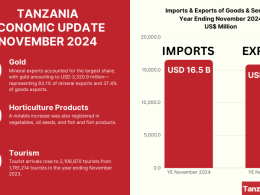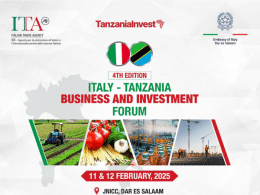Starting a business and registering a company in Tanzania involves a detailed legal framework governed by the Companies Act, Cap. 212 (2002) in mainland Tanzania and the Companies Act No. 15 (2013) in Zanzibar.
The process is overseen by the Business Registrations and Licensing Agency (BRELA), an executive agency under the Ministry of Industry and Trade. BRELA is responsible for business registration, licensing, and ensuring compliance with regulatory requirements in Tanzania.
DISCLAIMER: The information provided in this guide is intended for general informational purposes only and does not constitute professional advice. While we strive to ensure the accuracy and timeliness of the content, laws and regulations in Tanzania may change, and individual circumstances can vary. We strongly recommend consulting with a qualified professional or legal advisor in Tanzania to ensure compliance with current requirements and to address your specific needs. TanzaniaInvest declines any responsibility for actions taken based on the information contained in this guide.
Table of Contents
- Types of Companies in Tanzania
- Step-by-Step Company Registration Process
- 1. Reserve a Unique Company Name
- 2. Prepare the Memorandum and Articles of Association
- 3. Identify Business Activities and Required Capital
- 4. Nominate Directors and Shareholders
- 5. Secure the Required Capital
- 6. Obtain a Tax Identification Number (TIN)
- 7. Submit Registration Documents Online
- 8. Pay Registration Fees
- 9. Obtain a Certificate of Incorporation
- 10. Register for Tax and Social Security
- 11. Obtain Business Licenses
- 12. Open a Local Bank Account
- 13. Immigration Compliance for Foreign Directors and Employees
- Time Required to Register a Company
- Costs Involved in Registering a Company
- Post-Registration Compliance
- 1. Tax Registration and Compliance
- 2. Business Licenses and Permits
- 3. Opening a Bank Account
- 4. Establishing an Accounting and Record-Keeping System
- 5. Employment and Labor Compliance
- 6. Filing of Annual Returns
- 7. Intellectual Property (Optional)
- 8. Compliance with Sector Regulations
- 9. Maintenance of Statutory Registers
- 10. Reporting Changes
- 11. Annual General Meeting (AGM)
- 12. Statutory Returns
- 13. Additional Compliance Considerations
- 14. Insurance Coverage
- 15. Participation in Local Business Associations
- 16. Investment Incentives (For Foreign Investors)
- Taxation and Tax Incentives
Types of Companies in Tanzania
Tanzania recognizes several types of companies under its laws, including:
- Private Limited Company (LTD/LLC):
- A private company with limited liability for shareholders.
- Requires a minimum of two shareholders and two directors in mainland Tanzania, while Zanzibar allows a single-shareholder company.
- Shares cannot be offered to the public.
- Public Limited Company (PLC):
- A public company that allows members of the public to subscribe to its shares.
- Requires at least seven shareholders and must have a share capital as stated in its Memorandum.
- Suitable for businesses seeking to raise capital publicly.
- Company Limited by Guarantee:
- Non-profit organizations where members’ liability is limited to the amount they have guaranteed.
- Commonly used by charitable and social enterprises.
- Unlimited Company:
- Members have unlimited liability for the company’s debts.
- Sole Proprietorship:
- A business owned and operated by a single individual.
- Personal liability applies to all debts and obligations of the business.
- Common for small-scale businesses and entrepreneurs.
- Branch of a Foreign Company:
- A foreign company can establish a branch in Tanzania or Zanzibar by obtaining a Certificate of Compliance.
- Treated as a local company for compliance purposes but is not a separate legal entity.
Step-by-Step Company Registration Process
Anyone can register a company in Tanzania, provided they are between the ages of 21 and 70, as stipulated in Section 194 of the Companies Act, Cap. 212.
1. Reserve a Unique Company Name
The company name must be unique and conform to the Business Names (Registration) Act. It’s important that the name reflects your business activities while adhering to the rules set by the Business Names (Registration) Act. Use BRELA’s online system to:
- Conduct a name search.
- Reserve the name for registration.
2. Prepare the Memorandum and Articles of Association
Drafting these foundational documents is critical:
- The Memorandum outlines the company’s objectives and scope.
- The Articles define the internal management structure, including director responsibilities and shareholder rights.
- Ensure compliance declaration forms (Form 14B in Tanzania Mainland) are completed.
The Memorandum and Articles of Association must be signed by all shareholders and directors. If any signatory is outside Tanzania, they can sign the documents in their home country, but these must be authenticated through an apostille or the Tanzanian Embassy. These documents will then be submitted to BRELA for registration.
3. Identify Business Activities and Required Capital
During registration, you must clearly define your primary business activities. These activities will determine the type of licenses and permits you need. Your business activities should align with the International Standard Industrial Classification (ISIC) codes, which are used for taxation and regulatory purposes. This step determines:
- The type of licenses and permits required.
- The minimum capital requirements, which vary by sector (e.g., microfinance businesses require TZS 20,000,000).
4. Nominate Directors and Shareholders
Once you have chosen your legal structure, the next step is to nominate your directors and shareholders. In Tanzania, you can establish a two-person company or involve multiple shareholders. Shareholding ratios and roles should be clearly defined in the Memorandum and Articles of Association, which form the foundation of your company’s operations.
The Companies Act requires:
- At least two directors and shareholders for LLC/LTDs in mainland Tanzania.
- Foreign shareholders to provide copies of passports and comply with other statutory requirements.
5. Secure the Required Capital
Tanzanian law mandates that businesses meet certain capital requirements. The minimum capital requirement depends on your industry, and some need at least 25% of the minimum capital while others like microfinances and banks need the minimum capital to be deposited into a local bank account once your company is established (a bank statement is needed as proof of fund).
6. Obtain a Tax Identification Number (TIN)
Each shareholder and director must obtain a Tax Identification Number (TIN) from the Tanzania Revenue Authority (TRA). This number is essential for tax compliance, opening bank accounts, and completing company registration.
7. Submit Registration Documents Online
Submit the necessary documentation through BRELA’s Online Registration System for mainland Tanzania or the Zanzibar Property and Business Registration System. Required documents include:
For Local Companies
a. Name Reservation
- Submit at least three unique company names to the Business Registration and Licensing Agency (BRELA) for approval.
- Ensure the names are distinctive and do not infringe on existing trademarks or businesses.
b. Memorandum and Articles of Association
- These documents must outline the company’s purpose, shareholding structure, operational guidelines, and liabilities of its members.
- It is advisable to engage a legal professional to draft these documents to meet Tanzania’s legal standards.
c. Shareholders and Directors
- Provide the full names, contact details, and Tax Identification Numbers (TIN) of all shareholders and directors.
- Include passport-sized photos and certified copies of identification documents (National IDs or passports).
d. Tax Identification Number (TIN)
- Each director must have a TIN issued by the Tanzania Revenue Authority (TRA). This is essential for the registration process.
e. Physical and Postal Address
- Provide a physical address where the business operates, including a postal address, email, and contact number.
- For companies operating in rural areas, ensure the address aligns with local administrative boundaries.
f. Declaration of Compliance
- Form 14b, a statutory declaration of compliance, must be signed by a legal practitioner or Commissioner for Oaths in Tanzania.
g. Others
- Form no 434 (Situation of registered office abroad and in Tanzania, list of directors of the company, persons who reside in Tanzania representing the Company, and declaration which is to be attested by the Commissioner for Oaths/Notary Public).
- Integrity pledge Form.
For Foreign Companies
a. Incorporation Documents
- Certified copies of the Certificate of Incorporation, Memorandum, and Articles of Association from the home country are mandatory.
- Ensure these documents are translated into English if originally in another language and certified by the issuing authority.
b. Board Resolution
- A board resolution must authorize the establishment of a branch or subsidiary in Tanzania.
- The resolution should specify the nature of business activities intended to be conducted.
c. Appointment of Local Representative
- Designate a local representative in Tanzania authorized to handle legal matters and correspondence.
- Provide their full name, address, and a signed letter detailing their responsibilities.
d. Statement of Charges
- Declare all existing charges or encumbrances on assets located in Tanzania.
e. Physical and Principal Addresses
- Provide the address of the company’s headquarters in the home country and the local office in Tanzania.
- A physical presence in Tanzania is mandatory for branch offices.
f. Financial Statements
- Submit the latest audited financial statements to demonstrate the company’s financial standing.
g. Others
- Form no 434 (Situation of registered office abroad and in Tanzania, list of directors of the company, persons who reside in Tanzania representing the Company, and declaration which is to be attested by the Commissioner for Oaths/Notary Public).
- Integrity pledge Form.
h. Work and Residence Permits for Foreign Employees
Foreign nationals intending to work and reside in Tanzania must secure both work and residence permits.
Note: The Minister of Home Affairs of Tanzania published the Immigration (Amendment) Regulations, 2023, to amend the Immigration Regulations of 1997 and facilitate business operations and investment in Tanzania. This includes the establishment of an Interim (Special) Pass designed to assist foreigners already residing in Tanzania by providing them a temporary status while they apply for and obtain a resident permit or complete other immigration formalities.
Residence Permit CLASS A
| CATEGORY | SECTOR | FEES IN US$ FOR NON-CITIZEN OF EAC | FEES IN US$ FOR CITIZENS OF EAC PARTNER STATES |
| A-1 | Persons intending to engage in the prospecting of minerals or mining. | 3,000 | 1,500 |
| A-2 | Large-scale investment, trade, and businesses including agriculture and animal husbandry. | 3,000 | 1,500 |
| A-3 | Members of prescribed profession and consultancy services. | 3,000 | 1,500 |
| A-4 | Small-scale trade, business, Artisanship fishing, farming, or any legally recognized activity. | 1,000 | 500 |
| A-5 | Diaspora Investors. | 1,000 |
Residence Permit CLASS B
| CATEGORY | SECTOR | ELIGIBILITY | FEES IN US$ FOR NON- CITIZEN OF EAC | FEES IN US$ FOR CITIZENS OF EAC PARTNER STATES |
| B-1 | Specific employment by specific employer. | Persons who have been offered Specific employment by a specific employer and have the required qualifications and experience. | 2,000 | 500 |
| B-2 | Specific employment by a specific employer. | Professionals, Technicians, and Associate Professionals from EAC partner states as prescribed in the Schedule to the EAC Common Market Protocol(Free Movement of Workers)Regulation. | – | 5 |
Work Permit Classes
| Work Permit Class | Non-Citizens concerned | Fee (US Dollar) | Maximum time of working in Tanzania |
| A | Investors or self employed | 1,000 | Beyond 10 years/as long as business exists |
| B | Non-citizens in possession of prescribed professions | 500 | 5 years |
| C | Non-citizens in possession of other professions | 1,000 | 5 years |
| D | Non-citizens employed or engaged in approved religious or charitable activities | 500 | 5 years |
| E | Refugees | Gratis | 5 years |
8. Pay Registration Fees
The costs for company registration vary by type and share capital:
- Name reservation: TZS 50,000.
- Certificate of Incorporation: From TZS 100,000 depending on share capital.
- Filing fees and other administrative charges: Approximately TZS 60,000.
Payment is made through BRELA’s online portal.
9. Obtain a Certificate of Incorporation
Once the Registrar reviews and approves the application, the company receives a Certificate of Incorporation. This document includes:
- The company’s registration number.
- The official date of incorporation.
- Legal confirmation of the company’s existence.
The process typically takes between 3 to 14 business days.
10. Register for Tax and Social Security
Post-registration requirements include:
- Registering with the Tanzania Revenue Authority (TRA) for a VAT number if the company’s turnover exceeds TZS 100 million.
- Registering with the National Social Security Fund (NSSF) for employee benefits.
11. Obtain Business Licenses
Depending on the industry, the company must:
- Apply for general or sector-specific licenses through BRELA or relevant local authorities.
- Obtain Occupational Safety and Health Authority (OSHA) compliance for certain sectors.
12. Open a Local Bank Account
A Tanzanian bank account is required to deposit the company’s initial capital. Leading banks include CRDB, NMB, and Stanbic Bank Tanzania.
13. Immigration Compliance for Foreign Directors and Employees
Foreign investors or employees must:
- Apply for a Class A (investors) or Class B (skilled workers) work permit.
- Obtain a residence permit for long-term stays.
- Short-term stays can be managed with a business visa.
Time Required to Register a Company
Setting up a business in Tanzania has become significantly easier in recent years. Starting a business in Tanzania now takes much less time than before. A company can typically be registered within just 3 to 5 working days if all the necessary required documents and attachments are ready, but it may take up to 14 days or more if there are missing documents or amendments.
Costs Involved in Registering a Company
a. Local Company Registration
Registration Fees:
These vary based on the company’s share capital:
- Up to TZS 1,000,000: TZS 95,000
- Between TZS 1,000,001 and TZS 5,000,000: TZS 175,000
- Between TZS 5,000,001 and TZS 20,000,000: TZS 260,000
- Between TZS 20,000,001 and TZS 50,000,000: TZS 290,000
- Above TZS 50,000,000: TZS 440,000
Filing Fees: Approximately TZS 66,000
Stamp Duty: Around TZS 6,200
Company Name Reservation: Around TZS 50,000
b. Foreign Branch Office or Subsidiary Registration
Filing Fees: USD 220 per document (2) equal to $440
Process: Documentation: Provide certified copies of the parent company’s Certificate of Incorporation, Memorandum and Articles of Association, and a board resolution authorizing the establishment of the branch in Tanzania.
Submission: Register the branch through BRELA’s ORS.
Costs: Registration Fee: USD 750
Post-Registration Compliance
After registering a company in Tanzania, there are several critical post-registration steps and compliance requirements to ensure smooth operation and adherence to legal and regulatory frameworks. Below is a detailed outline:
1. Tax Registration and Compliance
Obtain a Tax Identification Number (TIN):
- Mandatory for corporate tax compliance.
- Obtainable from the Tanzania Revenue Authority (TRA), it is free
Register for VAT (if applicable):
- Required for businesses with annual turnover exceeding TZS 200 million.
Self-Tax Assessments and Corporate Tax Compliance:
- Make self-tax assessment through the taxpayer portal (Use your tax consultant).
- Make tax revisions when the actual sales are more or less than the budgeted ones to be realistic and to avoid unnecessary penalties, fines, and interest
- Pay corporate income tax, currently at 30% this is paid after the deduction of your operational and administrative costs at the financial year end or accounting calendar but before the end of June 30 every year
Pay Withholding Tax and Stamp Duty on Your Lease Agreement
- For withholding tax is 10% of the annual rent
- For stamp duty is 1% of the annual rent
- The lease agreement should be attached with an Electronic Fiscal Device (EFD) receipt (so it should be stamped by an advocate who has EFD machine)
- Then get a tax clearance certificate ready to secure your business permits and licences
File Annual Returns:
- Submit annual tax returns to TRA by the deadline.
PAYE (Pay-As-You-Earn):
- Register and remit employee income tax deductions.
Withholding Tax:
- Deduct and remit withholding taxes for applicable transactions, such as services and rentals.
Excise Duty and Customs:
- Register if importing goods or dealing in excisable goods.
2. Business Licenses and Permits
Obtain a Business License:
- Apply through the relevant local authority or ministry based on your industry.
Sector-Specific Licenses:
- Industries like mining, banking, telecommunications, and healthcare require specific operational permits.
Environmental Compliance:
- Obtain an Environmental Impact Assessment (EIA) certificate for projects with environmental implications.
3. Opening a Bank Account
Corporate Bank Account:
- Open a dedicated business bank account in a Tanzanian bank.
- Provide registration documents, TIN, license, and proof of physical address.
Forex Accounts (if applicable):
- Open a foreign exchange account for international transactions.
4. Establishing an Accounting and Record-Keeping System
Adopt an Accounting Framework:
- Follow International Financial Reporting Standards (IFRS).
Bookkeeping System:
- Maintain accurate and up-to-date records of income, expenses, and other financial transactions.
Audit Requirements:
- Prepare audited financial statements annually.
5. Employment and Labor Compliance
Draft Employment Contracts:
- Ensure contracts comply with Tanzanian labor laws.
Employee Registration:
- Register employees with NSSF and TRA for tax compliance.
Work Permits for Non-Citizens:
- Apply for work and residence permits if employing foreign workers.
6. Filing of Annual Returns
BRELA Annual Returns:
- File with the Business Registration and Licensing Agency (BRELA) to update company records.
Submission Timeline:
- Returns must be filed within 28 days of the annual general meeting (AGM).
7. Intellectual Property (Optional)
- Protect your brand by registering trademarks with BRELA.
Patents and Copyrights:
- Register innovations and creative works as needed.
8. Compliance with Sector Regulations
Industry-Specific Bodies:
- Comply with regulatory bodies such as the Bank of Tanzania (BoT), Tanzania Communications Regulatory Authority (TCRA), or the Mining Commission.
9. Maintenance of Statutory Registers
Registers to Maintain:
- Shareholders register.
- Directors register.
- Register of charges and mortgages.
Minute Books:
- Keep records of board and shareholder meetings.
10. Reporting Changes
Change in Directors or Shareholders:
- Notify BRELA within 14 days of any changes.
Amendments to Memorandum and Articles of Association:
- Submit revised documents to BRELA for approval.
Change of Address:
- Update BRELA and TRA with the new physical or postal address.
11. Annual General Meeting (AGM)
Timing: Every company must hold an AGM each year, with no more than 15 months between successive AGMs. The first AGM should occur within 18 months of incorporation.
Notice: A minimum of 21 days’ notice is required, specifying the meeting’s time, place, and agenda.
Agenda: Standard business includes:
- Reviewing annual accounts.
- Presenting the directors’ and auditors’ reports.
- Declaring dividends.
- Electing or re-electing directors.
- Appointing and determining auditors’ remuneration.
Consequences of Non-Compliance: Failure to hold an AGM can result in fines for the company and its officers.
12. Statutory Returns
a. National Social Security Fund (NSSF)
- Registration: Employers must register their businesses and employees with the NSSF.
- Contributions: Employers are required to contribute 10% of each employee’s monthly earnings to the NSSF.
- Payment Schedule: Contributions should be remitted monthly, with specific deadlines as stipulated by the NSSF.
- Penalties: Late payments may attract penalties and interest charges.
b. Workers Compensation Fund (WCF)
- Registration: Mandatory for all employers to register with the WCF.
- Contributions: Private sector employers contribute 0.6% of each employee’s monthly earnings.
- Payment Schedule: Contributions are typically remitted monthly.
- Penalties: Non-compliance can lead to fines and legal action.
c. TASIWU – For Industrial Workers
- Applicability: Pertains to specific industries; employers should verify relevance to their sector.
- Contributions and Compliance: Employers in applicable industries must adhere to TASIWU’s specific contribution rates and reporting requirements.
d. Business Registrations and Licensing Agency (BRELA) Annual Returns
- Filing Requirement: Companies must file annual returns with BRELA, detailing company particulars.
- Deadline: Returns should be filed within 28 days following the company’s incorporation anniversary.
- Penalties: Late filing can result in fines and potential deregistration.
e. Bank of Tanzania (BOT) Quarterly and Annual Returns
- Applicability: Relevant to financial institutions and entities under BOT regulation.
- Reporting Requirements: Submission of detailed financial statements and other prescribed information on a quarterly and annual basis.
- Deadlines: Specific submission dates are outlined by BOT regulations.
- Penalties: Non-compliance may lead to sanctions, including fines and operational restrictions.
13. Additional Compliance Considerations
- Skills and Development Levy (SDL): Employers are required to pay a 4% levy on gross monthly emoluments.
- Occupational Safety and Health Authority (OSHA): Ensure workplace compliance with OSHA standards to avoid penalties.
- Record Keeping: Maintain accurate records of all contributions, filings, and meetings for statutory periods.
- Professional Guidance: Engage with legal and tax professionals to navigate compliance complexities effectively.
14. Insurance Coverage
General Business Insurance:
- Secure coverage for property, liability, and operations.
Employee Insurance:
- Provide health or life insurance benefits if applicable.
15. Participation in Local Business Associations
Chamber of Commerce:
- Join associations like the Tanzania Chamber of Commerce, Industry, and Agriculture (TCCIA) for networking and advocacy.
Sector-Specific Organizations:
- Engage with industry bodies for support and compliance updates.
16. Investment Incentives (For Foreign Investors)
Tanzania Investment Centre (TIC) Registration:
- Access tax incentives, land ownership facilitation, and work permits.
Export Processing Zone (EPZ):
- Benefit from duty-free and tax-free privileges for manufacturing and export.
Taxation and Tax Incentives
Overall Taxation in Tanzania
https://www.tanzaniainvest.com/tax
Corporate Taxation in Tanzania
https://www.tanzaniainvest.com/economy/corporate-tax-guide
Tax and Other Incentives
These are offered by TIC and EPZA to Investors in Tanzania: https://www.tanzaniainvest.com/economy/tax-incentives-obtain-tic-certificate-and-epza-licenses










